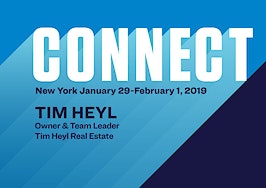When Climb Real Estate, one of the hippest independent brokerages in the San Francisco Bay Area, was acquired by Realogy’s NRT, questions emerged about what it all meant — would Climb be able to continue to innovate in the same way? Christine Kim, who’s been an agent with Climb for years and was recently named the brokerage’s president, says that the brokerage has been able to maintain its pace of trying new, different strategies and technologies, which has been one key to its success in an environment where new and different is prized.
Kim will be on a panel discussion about lighting fires in the age of innovation at Inman Connect New York, January 29 through February 1 at the Marriott Marquis Times Square. She shared her thoughts on key areas where smooth execution can make a big difference to buyers and sellers, how to embrace the shifting market and more.
Tell us a little more about your session. How will it address how the industry can embrace the shifting market?
I think there’s always going to be some nervousness around change, but I think what’s really interesting is that we were in such an up cycle for almost the last three to four years, and we saw all these new players come in and all these technologies that were all over the industry — from brokerage models to how to improve workflow automation and make your staff more efficient. There’s just so much coming in now. With this shift in the market, there’s so much more pressure on the brokerages to make sure that they actually pick and choose the right technology to fit in with the agent journeys and customer journeys of where they are.
Climb was really on top of that. We had Climb Labs that incubated new technologies before we deployed them into the agent base, and I think it’s even more critical now because we get inundated with different companies coming in and saying “this is perfect for agents or your brokerage,” but the tough part is understanding where it really fits into the life cycle of the transaction and customer interaction, and also adoption. We’re born and bred in Silicon Valley and supposed to be super high tech, but the level of adoption is so low if we don’t carefully figure out how to inject it into the agent base. We have to innovate, but innovate in ways that really apply to the actual agent journey, agent life cycle and customer transaction lifecycle.
IBuyers and discount brokerages play a part in creating a little bit more of a competitive landscape, but a discount doesn’t take away the rest of the transaction and all the things you have to do to get something closed. It’s really a combination of finding the right technologies that are out there and injecting them into your value proposition to make sure brokers and agents can articulate their value proposition in a way that’s competitive. You’re going to have consumers who want to use those platforms and are in those different financial situations.
I’ve been through a few cycles, and it is going to get more difficult in terms of just prospecting for buyers and sellers and having to compete now against some of the newer brokerage models and newer types of brokerages that are out there. I think a lot of us have been hit by Compass, and the big shiny object is their tools, but it’ll be really interesting to see, as the market shifts, are the tools going to be enough? Is that going to be enough to seal the deal?
What do you think are the biggest opportunities to focus on in the real estate industry right now?
I do see an increased investment in changing the practice of real estate, so I think that there is going to be huge opportunity in technology when it comes to big data and artificial intelligence (AI). I feel like some of the tools that we see across the board are really interesting, but the ones that can actually make agents’ lives easier focus around AI and big data. We want to focus on how to improve marketing to save you time. Marketing is such a huge part of that, combing through your database and making sure to contact your clients however many times a year. Tools like First.io are great because it really does save you time. We’ve been playing with it and it was like “three of my friends just put their houses on the market!”
We’ve seen so many different types of technology, and that’s an opportunity to see where it fits in an agent journey. There are so many technologies that can be injected, but it’s trying to choose the right one that fits. All of us at Climb have sold before and we’ve all been really high-producing agents, so it’s easy for us to identify what might work, but every agent is so different — and that’s the challenge.
To stay competitive, agents, brokers and companies need to execute quickly. What do you feel are key areas where quick execution can vastly improve the customer experience?
There are so many, from the beginning for buyers and for sellers in different aspects. One thing that comes to mind is literally just the way that we communicate, and I think again, technology plays a part in this, too. For instance, if you’re a seller, it’s really stressful as a seller to receive 10 offers and trust your agent to be telling you every single term of every single offer. At least in San Francisco, you’re dealing with hundreds of pages of paperwork that are supposedly getting delivered to you as part of that package. Presentation technology can help there, where you can aggregate everything, put it together and present it to your client in a way where it’s all in one place and everything is there and you can always refer back to it. That’s one pretty fantastic thing about technology especially when we had all these multiple offer situations — it was insane sifting through all these emails and documents.
From a buying perspective, if there was a way for an agent to constantly keep in touch with their buyers — being able to communicate that flow back and forth is really incredible. If we can, as a brokerage or as an agent, be able to say “here are the different values that we bring to the table,” that would be really helpful. It can be such a disjointed experience, and each location is different. Even a location 30 miles away operates a little differently, so it’s hard to create a generic package for a value proposition.
What are your hopes for the next 12 months, and what will you be working on?
There’s some exciting stuff going on at Climb. We’ll be working really closely with national as they build out the franchise. One of the cool things about working with Realogy is that a lot of the stuff we’re doing was validated — we’re working with a new generation of clients. We’re working on a mobile app where you can do everything from your phone; it’s going to be really interesting as they test out and build the value proposition. Climb is going to be a testing ground for the pilot to make that agent journey a lot more efficient, so we’ll be working on getting things up and running, and getting the franchise to a point where it’s ready to go and someone can open up a Climb wherever they go. So we’re working on that, and we’re constantly looking at new technology.
Climb Labs is something really special, and we’re hoping to innovate through that. Now that the market is shifting, one of my key focuses is training and productivity in this new tech-forward day and age, and what’s interesting, I find, is it all still comes down to the relationship, and it still comes down to somebody physically walking through that property. I’m really going to be focused on “how do we marry that technology, get people through the door and enhance that customer relationship,” because the customer is also something to focus on.
Dig deeper into how to fail smarter and discover the opportunities in a changing market at Inman Connect New York, January 29 – February 1. Jumpstart 2019 with tactical takeaways, unlimited networking and thought-provoking speakers. Learn more.
Thinking about bringing your team? You may qualify for special group perks! Contact us to learn more.















